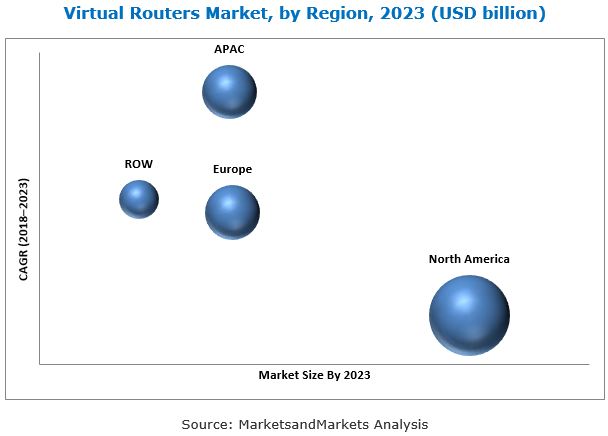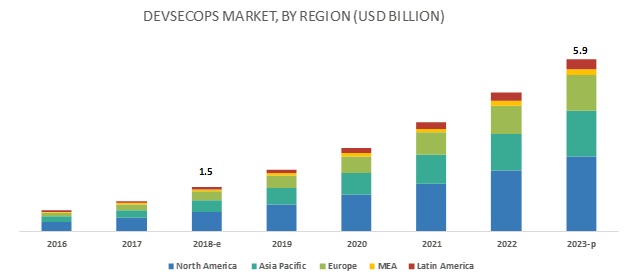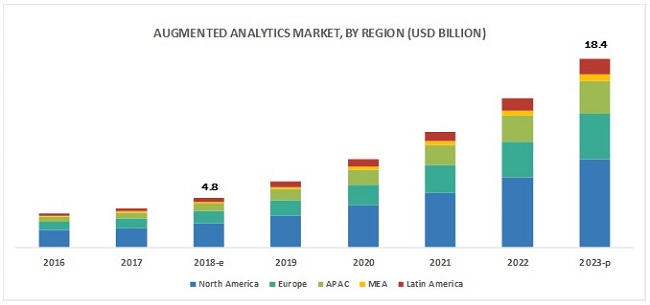According to a new market research report "Virtual Router Market by Component (Solution (Integrated and Standalone) and
Service), Type (Predefined and Custom), End-User (Service Provider (Telecom,
Data Center, and Cloud) and Enterprises), and Region - Global forecast to
2023", published by MarketsandMarkets™, the global Virtual
Router Market size is expected to grow from USD 116.8 million in 2018 to USD
331.5 million by 2023, at a Compound Annual Growth Rate (CAGR) of 23.2% during
the forecast period.
For more Insights on this report, speak to our analyst:
https://www.marketsandmarkets.com/speaktoanalyst.asp?id=222860236
The major factors driving the growth of the Virtual Router Market
are the decrease in CAPEX and OPEX, growth in demand for SDN and NFV, and the
increasing need for mobility. Furthermore, growing demand for private cloud and
virtual router applications across network segments are expected to provide
significant growth opportunities in the market.
Browse in-depth TOC on "Virtual Router Market”
54-Tables
47 Figures
125 Pages
54-Tables
47 Figures
125 Pages
The integrated solutions segment is expected to be the
larger contributor in the Virtual Router Market during the forecast period.
The integrated solution includes virtual router offerings
integrated in a large SDN and NFV suite. Major network providers, such as Cisco
and Juniper, offer virtual router capabilities within their NFV suite. Service
providers and carriers can enable the virtual router capabilities within their
network, which is offered by the players at various network segments, such as
IP network, virtual mobile packet core, and cloud/NFV infrastructure. The
integrated solution segment has a large market share in the global Virtual
Router Market, as the major players, such as Cisco, Juniper, Ericsson, and
Nokia, are offering integrated virtual router solutions.
The managed services segment is expected to have the larger
market size during the forecast period.
Managed services include outsourced services, such as
infrastructure management and other support and maintenance services, to
monitor activities from the customers’ network to data centers. Virtual router
vendors assist their customers efficiently to manage routing functionality,
risk, and security within their networks. IBM and HPE are the key service
providers in the Virtual Router Market.
North America is expected to account for the largest market
size during the forecast period.
North America is the major revenue generating region in the global
Virtual Router Market. The region has witnessed the maximum adoption of virtual
router solutions, due to the increasing complexities in network infrastructure
across all the service providers. In the North American region, enterprises in
the US and Canada are expected to significantly adopt virtual router solutions.
Therefore, the region is expected to account for the largest market size during
the forecast period.

The major vendors in the global Virtual Router Market are IBM (US), Cisco (US), Ericsson (Sweden),
Huawei (China), Nokia (Finland), Juniper (US), net Elastic (US), Brocade (US),
HPE (US), Arista Networks (US), ZTE Corporation (China), Carbyne (Israel), Palo
Alto Networks (US), Check Point Software (Israel), Ross Video (Canada),
Inventum (India), Drivenets (Ha-Sharon), 128 Technology (US), TRENDnet (US),
Linksys (US), TIME (Malaysia), ACCESS (Japan), Allied Telesis (Japan),
Connectify (US), and 6WIND (France).




